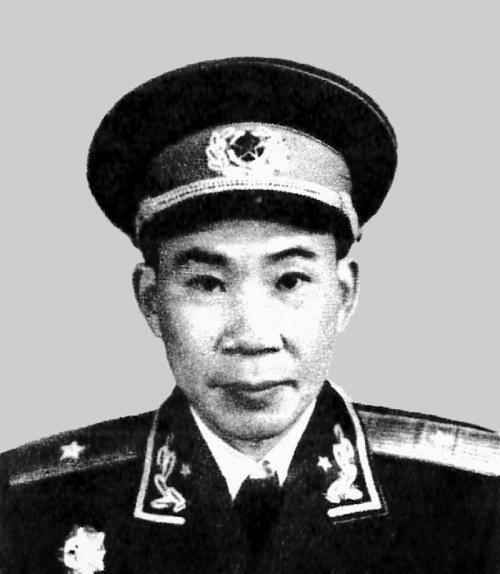From begging for rice to the founding general of the republic, who knows the hardships of this journey?
Living in peacetime is a blissful thing. There is no uprooting from home in the war years, and there is no life-and-death parting of gunfire. But we must not forget those revolutionary predecessors who made sacrifices so that we can now live in peace!
In the 1920s and 1930s, warlords were at war, and the people could not live and work in peace and contentment, so at that time, the anti-feudal and anti-warlord struggle boomed throughout the country. Especially in some poor rural areas, many young people struggling with their livelihoods will join the ranks of the revolution. When the children of these poor families joined the revolutionary ranks, they did not have lofty ideals, and many of them sometimes wanted to have a full meal, which in the final analysis was a question of the right to subsistence.

Founding Major General Qi Dinggen joined the Red Army in order to "beg for a bite to eat."
Qi Dinggen is a native of Jinxian County, Jiangxi Province, whose family is poor, and often has not had enough to eat, and has a difficult life since childhood, is hungry and full, and is also bullied. In 1930, when the Red Army arrived in his hometown, the 14-year-old Qi Dinggen could not stand the days of hunger and cold, so he signed up for the Red Army. The leader in charge of recruiting the Red Army asked him, why did you join the Red Army?
Qi Dinggen was a real child, and he replied without hesitation: "Beg for a bowl of rice!"
How simple is this answer, I wonder how many soldiers who joined the Red Army in those years did not join the revolution to solve their own food and clothing?
Poor thinks differently, there is nothing wrong with it! Yearning for the pursuit of a better life, who dares to say that he is wrong?
The commander in charge of recruiting agreed to Qi Dinggen's request and let him join the Red Army.
After joining the Red Army, Qi Dinggen was first assigned to the Fifth Regiment of the Second Division of the Red Army as a soldier, and successively participated in the second to fifth anti-"encirclement and suppression" and Long March battles in the Central Soviet Region.
Because of his bravery in battle, he was promoted to squad leader, platoon leader, and company commander. After arriving in northern Shaanxi, he took part in the battles of Quzi Town and Zhiluo Town. During the Battle of Quzi Town, he led a platoon deep into the enemy position and captured the commander of the enemy cavalry brigade.
During the War of Resistance Against Japanese Aggression, he served as a company commander of the 685th Regiment of the 343rd Brigade of the 115th Division of the Eighth Route Army, and after participating in the Battle of Pingxingguan, he was later promoted to battalion commander of the 685th Regiment. In September 1938, after marching east with the troops to Jilubian, he participated in the struggle to create and consolidate the Luxi base area. From 1940 onwards, he successively served as the deputy commander and regimental commander of the 115th Division of the Eighth Route Army, and led his troops to fight in Jiluyubian.
During the Liberation War, he served as deputy brigade commander of the first brigade of the first column of the Jinji-Hebei Luyu Military Region, deputy brigade commander of the deputy first brigade of the Central Plains Field Army, and commander of the Forty-sixth Division of the Sixteenth Army. Later, he marched to the southwest, participated in the Sichuan-Qianqian Campaign, and after the liberation of Guiyang and Chengdu, he served as the commander of the Tongren Military Sub-district in Guizhou.
After the founding of the People's Republic of China, he served as the commander of the 35th Division of the 12th Army of the Chinese Volunteer Army, led his troops into the DPRK to participate in the War to Resist US Aggression and Aid Korea, and was awarded the rank of major general in 1955.
Just one for the sake of "begging for rice!" "The warriors, who later grew up to become the founding major generals of a republic, were the hardships of that. It is not something that I can completely describe in such a small short article.
Finally, he quoted his wife Chen Yu's recollection: "Qi Dinggen was seriously injured 8 times during the war years, and the minor injuries are innumerable. There was a groove-shaped scar trench in the middle of his head, 1 centimeter deep and 20 centimeters long, which was left by an enemy bullet during the Long March across the meadow. There are four bullet holes between the bridge of the nose and the left cheek of the face, arranged in a horizontal line, which is also left when crossing the grass, and one bullet enters from one side of the left cheek, the other side, and then enters from the left side of the nose and exits from the right side, so that there are four bullet holes. There was a penetrating wound in the chest of the nail root, and the bullet flew out of the gap between the two ribs of the front chest and the back chest, and the bullet hole was only 1 cm from the heart. ”
Let us pay tribute to the heroic founding fathers of the Republic with a grateful heart!